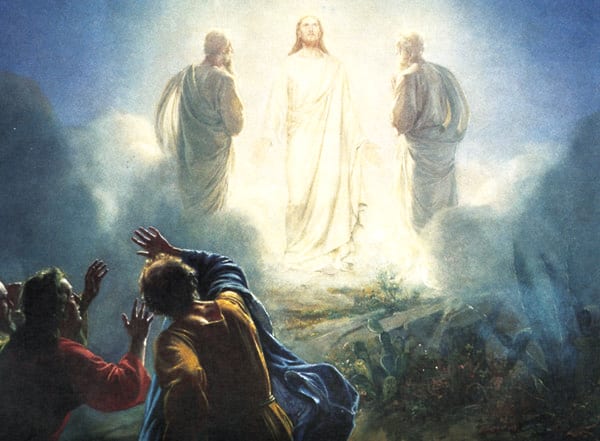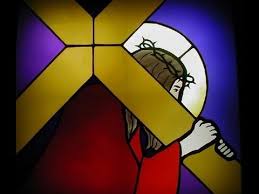
Jesus Transfigured
Some Bible readers tend to regard the Transfiguration account in the Gospels of Matthew, Mark and Luke as an independent story where the glory of Jesus was manifested to three chosen disciples. However, a closer look at Luke chapter nine reveals that the evangelist placed it together with other incidents in order to focus on the identity of Jesus. It begins with Herod asking: “Who is this about whom I hear such things?” (Lk 9:9) From there, Luke’s Gospel provides various answers to Herod’s question: Jesus is the One in whom God’s power is present through the miracle of the feeding of the five thousand (Lk 9:10–17); Jesus is the “Messiah of God” as confessed by Peter (Lk 9:18–21); Jesus is the suffering Servant of Isaiah (Lk 9:22, 44–45); Jesus is the Master, whom His disciples must follow even to death (Lk 9:23–27); Jesus is the Son of God as revealed by the Father’s voice at the Transfiguration (Lk 9:28–36).
The Transfiguration account is more than just the glory of Jesus, as the Son of God, being manifested to His chosen disciples Peter, James and John. Situated shortly after the first time Jesus told His disciples that He must suffer greatly and be rejected by the elders, the chief priests, and the scribes, and be killed and on the third day be raised (cf. Lk 9:22), the Transfiguration prefigures and confirms that Jesus’ suffering will lead to His glory. Christians are given the hope that Jesus the Christ, the Son of God, the Way, the Truth and the Life, leads us through the sufferings in life to eternal glory.
The Transfiguration story is so vital in today’s times. There is so much crime, hate and suffering of the innocent all over the world. Many people do not know what to think anymore. A case study would be the character of Ivan in Dostoevsky’s novel The Brothers Karamazov. Ivan believes that a God who is infinitely good and just should have created a world where there is no suffering. He cannot accept the idea that the suffering of the innocent is part of a greater plan. Here is part of Ivan’s conversation with his brother Alyosha:
I tell you that I accept God simply… I accept God and am glad to, and what’s more, I accept His wisdom, His purpose–which are utterly beyond our ken; I believe in the underlying order and the meaning of life. I believe in the Word to Which the universe is striving, and who Himself was ‘with God,’ and Himself is God and so on…Yet, in the final result I don’t accept this world of God’s, and, although I know it exists, I don’t accept it at all. It’s not that I don’t accept God, you must understand, it’s the world created by Him I don’t and cannot accept. Let me make it plain. I believe like a child that suffering will be healed and made up for, that all the humiliating absurdity of human contradictions will vanish like a pitiful mirage… that in the world’s finale, at the moment of eternal harmony, something so precious will come to pass that it will suffice for all hearts, for the comforting of all resentments, for the atonement of all the crimes of humanity, of all the blood they’ve shed; that it will make it not only possible to forgive but to justify all that has happened with men — but though all that may come to pass, I don’t accept it. I won’t accept it.
There are many Ivans in the world. It is extremely difficult, if not impossible, for them to accept the pain and suffering in the world. But for many other people with faith, the answer lies in the mysteries of the Word of God becoming man and the death of the Son of God, in which God Himself underwent pain and suffering in order to lead us, through it, to heavenly glory. That is why the Transfiguration story is so vital in today’s time.
St. Paul exhorts the early Christians in Corinth: Therefore, we are not discouraged; although our outer self is wasting away, our inner self is being renewed day by day. For this momentary affliction is producing for us an eternal weight of glory beyond all comparison, as we look not to what is seen but to what is unseen; for what is seen is transitory, but what is unseen is eternal. (2Cor 4:16-18)
The people of God simply do not march on without suffering into the victorious future in which St. Paul talks about. We will be tested and tried. Yet in the end, these inevitable griefs will gather us closer to the heart of the crucified yet risen King and will reveal His glory in the Church for which He died.
Luke chapter nine concludes with Jesus and His disciples departing for Jerusalem, wherein the predictions of the Passion of Christ will eventually play out in reality. At this point in time in our journey through Lent, let us also accompany Jesus — on to Jerusalem!

Our one-day Lenten retreat and pilgrimage will be on March 19, 2022 at the Purification Heritage Center (PHC). Save the date on your calendar. Children accompanied by their parents are welcome. There are no fees for this retreat. Please register with Daisy. For more information, please check our post: Lenten Retreat and Pilgrimage

Come and join us for Stations of the Cross during Lent. Stations of the Cross in Chinese are held every Wednesday after the 12:00pm Mass, Stations of the Cross in English are held every Friday after the 12:00pm Mass.

Our church is planning to host the first Chinese Cursillo in the Archdiocese of Atlanta from July 28 to 31, 2022. The goal of this 72-hour retreat is for parishioners to be enflamed in their faith, to be living witnesses of Christ’s love, and to become vibrant members of their parish. Brother Anhsing Shen will give us a short talk about the Cursillo.
Prayer List: Zheng Zhiming, Wang Dacheng, Carolyn Johnson, Pan Bohao, Long Guorui, Zhang Qiang, Xu Taicheng and Qiu Laihao.